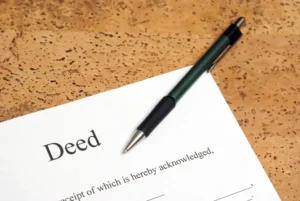What are the Elements of a Texas Warranty Deed and What are the Warranties?~2 min read
 When Springer & Lyle represents a party to a real estate transaction, a deed passes between the buyer and seller. The deed is a signed legal writing that’s used to transfer and memorialize ownership or an interest in real estate from the owner to a new owner. These parties are ordinarily called the grantor and grantee. To be operative, a deed must comply with certain legal elements. First, the deed must be in writing, and the grantor must be over the age of 18 and have legal capacity. Grantee must be in a legal position to receive the deed and accept it. Both the buyer, seller and the description of the property being transferred must be sufficiently described. It must contain language that clearly conveys the property and be signed by everybody that has an interest in the property.
When Springer & Lyle represents a party to a real estate transaction, a deed passes between the buyer and seller. The deed is a signed legal writing that’s used to transfer and memorialize ownership or an interest in real estate from the owner to a new owner. These parties are ordinarily called the grantor and grantee. To be operative, a deed must comply with certain legal elements. First, the deed must be in writing, and the grantor must be over the age of 18 and have legal capacity. Grantee must be in a legal position to receive the deed and accept it. Both the buyer, seller and the description of the property being transferred must be sufficiently described. It must contain language that clearly conveys the property and be signed by everybody that has an interest in the property.
A general warranty deed provides most title protection to the grantee. Conversely, the quitclaim deed offers the least amount of protection. With conveyance of the general warranty deed, seller guarantees certain things to the buyer. The guarantees are called covenants. With those covenants, grantor promises to protect the title of grantee against any adverse claims to the land by anybody making claim to it.
The first warranty provided by the grantor is that of merchantability of title. Grantor promises grantee that the grantor, and nobody else but the grantor has sole and merchantable title to the property. The next warranty provided by grantor is that there are no encumbrances or claims against the property except those that are expressly excluded in the deed. The third warranty given by the grantor is that of quiet enjoyment in that grantee’s possession of the property won’t be disturbed by a third party. The final warranty is that of quiet assurance, in that grantor will deliver to grantee in the future, any legal instruments necessary to make title to the property good. A breach of any one of these warranties is why we have title insurance.
A real estate closing isn’t limited to payment of money and conveyance of a deed. It’s a complex process involving numerous documents, each of which can affect your title to property. Whether a buyer or seller, your title will be well protected by Springer & Lyle when you’re buying or selling real estate.





